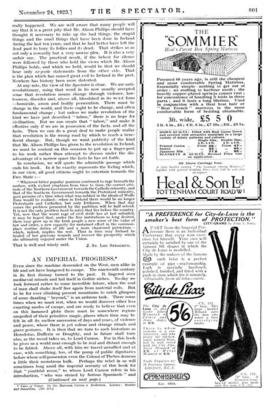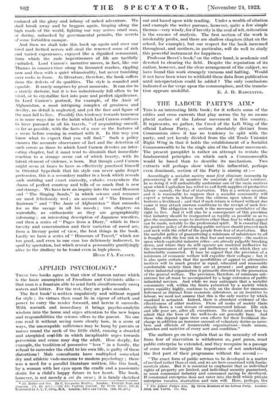AN IMPERIAL PROGRESS.
EVER since the machine descended on the West, men alike in life and art have hungered to escape. The nineteenth century in its first dismay turned to the past. It lingered over mediaeval missals and hid itself in Gothic niches. To-day we look forward rather to some incredible future, when the soul of man shall shake itself free again from material coils. But to be for ever climbing present mountains to catch glimpses
of some dazzling " beyond," is an arduous task. There come times when we must rest, when we would discover other less exacting modes of escape, and are ready to believe that even on this harassed globe there must be somewhere regions unspoiled of their primitive magic, places where time may be felt in all its mellow succession of days and years, of violence and peace, where there is yet colour and strange rituals and grave gestures. It is then that we turn to such historians as Herodotus, Dufferin or Doughty, and in future shall turn also, as the mood takes us, to Lord Curzon. For in this book he gives us a world near enough to be real and distant enough to be fabled. Above all, with him we travel unruffled and at ease, with something, too, of the pomp of public dignitaries before whose self-possession even the Colossi of Thebes demean a little their monstrous bulk. Perhaps the rebel in us will sometimes long amid the imperial serenity of this book for that " youthful rover," to whom Lord Curzon refers in his introduction, " who was stoned by furious Spaniards " and (Continued on next page.)
• Tales of Travel. By the Mammas Curzon o Kediuton. London : Hodder and Stoughton. 128s met./
endured all the glory and infamy of naked adventure. We shall break away and be beggars again, limping along the high roads of the world, fighting our way across cruel seas, or daring, unbacked by governmental permits, the secrets of some forbidden mosque.
And then we shall take this book up again and over our
tired and fretted nerves will steal the renewed sense of rich and varied experiences, enjoyed like a dignified ceremonial, from which the rude impertinences of life are tactfully excluded. Lord Curzon's narrative moves, in fact, like our Thames in summer-time along its favoured reaches, rippling now and then with a quiet whimsicality, but never tumbling over rocks in foam. As literature, therefore, the book suffers from the defects of its qualities. The style is rounded and equable. It rarely surprises by great moments. It can rise to a stately rhetoric, but it is too industriously full often to be vivid, or to crystallize fact into pure and perfect significance. In Lord Curzon's portrait, for example, of the Amir of Afghanistan, a most intriguing complex of greatness and devilry, no detail is neglected, and yet the face and figure of the man fail to live.. Possibly this tendency towards tameness is in some ways due to the habit which Lord Curzon confesses to have pursued in all his travels, " of acquainting. oneself, so far as possible, with the facts of a case or the features of a scene before coming in contact with it. In this way you know what to expect that you will find." Such a policy ensures the accurate observance of fact and the detection of such errors as those to which Lord Curzon devotes an inter- esting chapter, but it must tend to diminish that immediate reaction to a strange scene out of which beauty, with its latent element of•violence, is born. But though Lord Curzon might seem at times- to have so effectively practised himself in Oriental hyperbole that his style can never quite forget pretension, this is a secondary matter in a book which reveals such untiring and exact curiosity, exhales everywhere the charm of perfect courtesy and tells of so much that is new and strange. We have here an inquiry into the vocal Memnon and " The Singing Sands," in which science, and romance arc most felicitously wed ; an account of " The Drums of
Kairwan " and " The Amir of Afghanistan " that unmasks for us the savage- in all his moods ; two chapters on waterfalls, as - enthusiastic as they are geographically informing ; an interesting description of Japanese wrestlers, and then a series of " Pages from a Diary," which in their brevity and concentration and their variation of mood arc, from a literary point of view, the best things in the book. Lastly we have a series of " Humours of Travel," which are too good, and even in one case too deliciously indiscreet, to spoil by quotation, but which reveal a personality gratifyingly alive to the drollery to be found even in high places.
HUGH I'A. FAUSSET.



















































 Previous page
Previous page